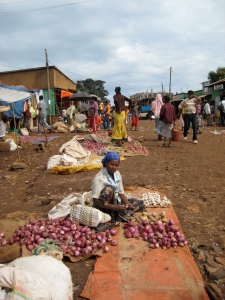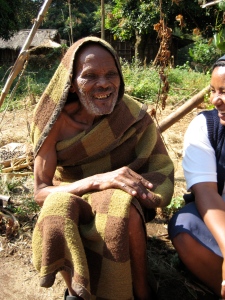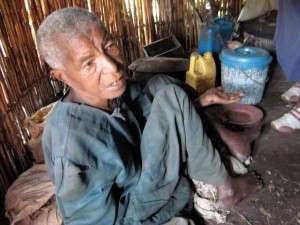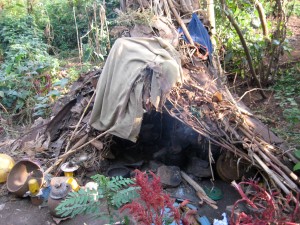– I found out that I can take a shower with one-and-a-half small pitchers of water. If you give me two more pitchers, I can wash my hair. Yes, it takes more water to wash my hair, than it does to wash my body.
– We often use toilet paper as our napkins during meals here.
– Each time we go walking outside the compound we gather an entourage. A flock of children come running and surround us, then follow us wherever we go.
– It’s not IF you have diarrhea but WHEN you have diarrhea.
– The roosters crowing and cows mooing outside our window are sounds that Casey and I have felt at home with – sounds of our childhood on the farm. But the loud footsteps of running monkeys on our roof and wild dogs howling for hours on end through the night are new for us in Ethiopia.
– I love the smell of coffee. I hate the taste of it, but love the smell of it. We lay out coffee beans in our bathroom to cover up the smell of the raw sewage. Sweet.
– On Market Days (Wednesdays and Saturdays), we commute into town with the rest of Dembidollo residents. It is a sea ofdonkeys with a scattered few of us humans humming them along. The occasional truck may pass, but donkeys, goats and cows have the right of way.
– I have been called “lady” by the Egyptians, “white-person” (mazungu) by the Ugandans and “mama” by the Rwandans. I was even lucky enough to be called “madam” in a few places in Rwanda, which I actually took a liking to. Here in Ethiopia I am called “faringee,” which simply means: foreigner.
– I am white. Not olive toned, tan, or Latina colored as I had always thought, but just plain white. You see, in Africa, where everyone else is incredibly dark, we become lighter. Now I understand better what it must be like to be an African-American in a mostly white society. Here, we just call ourselves “the crackers.”
– Staring is commonplace here and not considered rude. People, children especially, will be walking right next to you with their head cocked sideways and won’t take their eyes off of you for uncomfortably long periods of time. I try to do it back to them, but for some reason it just feels strange. And really, it doesn’t have the same effect on them that it has on us. (As for me [Casey], I have made it somewhat of an entertainment to stare back, particularly at the little kids. There are typically two responses. The first is the kid gets a big smile and then grabs the nearest friend and exclaims something to the tune of, “Hey, the cracker just looked at me!” The other (and a bit more entertaining) response is the kid gets a wide-eyed look of terror and begins to back away as quickly as possible, usually accompanied by screaming and/or crying. It’s all fun and games until I give “the stare” back. I’ve also had fun staring back at young men staring at my wife. They hold their gaze a bit longer than the little kids but the effect is somewhat similar. But the screaming is all inside, I am sure.)
– I start my morning each day with a cup of freshly warmed milk  straight from the cow’s udders. One of the hostel girls (orphan) carries over the fresh milk in a recycled water bottle after she milks the cow. This is then warmed and ready for us at mealtime. I make hot chocolate out of mine (insert smile)!
straight from the cow’s udders. One of the hostel girls (orphan) carries over the fresh milk in a recycled water bottle after she milks the cow. This is then warmed and ready for us at mealtime. I make hot chocolate out of mine (insert smile)!
– The water came on for about an hour this morning. Not only that, but it coincided with the electricity being on at the same time, so we felt in luxury. We frantically filled our bathroom water drum with water so we can flush our toilet for the next few days and take a bucket shower here and there. There are big white chunks of something floating around everywhere in it. We are hoping that they will all settle at the bottom before we shower next.
– I found a dead cockroach in the cooking oil the other day. The cook looked at me strange and laughed at me when I asked if we still wanted to use it. She just grabbed a few teaspoons out of the can and put it in our dough, left the cockroach floating inside, and placed the large can back in it’s designated place. Apparently, we have been ingesting the roach remains for sometime already.
– Remember dial-up internet? We had forgotten, but now we remember. I think it is still trying to connect.
– We become real-life bobble heads every time we hit the road in Ethiopia. The roads are a sea of deep dirt potholes – sometimes muddy and the other times crazy dusty. We haven’t experienced third gear very often.
– We have attended a coffee ceremony (often in our honor) every other day since the day we arrived in Ethiopia. During these traditional coffee ceremonies they scatter freshly cut grass and beautiful flowers on the ground to “bring in the freshness and fragrance of nature.” There is a small table with coffee cups placed on the grass and then the host sits on a small stool next to a mini charcoal stove where they roast freshly picked coffee beans in front of us. These beans have been drying in the sun for the past few days, no joke! After being roasted, and while the smoke is still rising from the pan, the pan is then passed by the guests so we may draw the smoke near us with our hands and inhale the aroma (I love this part). It is then ground up with a pestle and mortar before being brewed and served to us immediately. Neither Casey nor I drink coffee, but we partake it with honor here. Of course I cannot get mine down without throwing in an extra spoonful of sugar or two (though commonplace is three). That’s okay though, it adds to the experience right? So you will be happy to know that we are often running around with an authentic Ethiopian buzz here. Ethiopia…the birthplace of where coffee was discovered.







